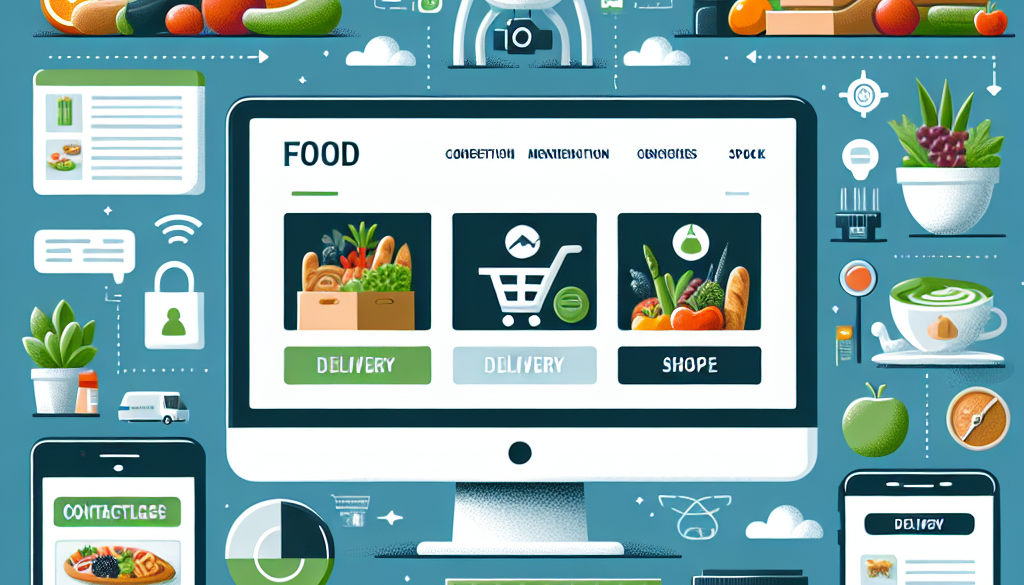What Food eCommerce Trends Must Businesses Adopt?
-
Table of Contents
- Top Food eCommerce Trends Businesses Should Embrace
- Personalization and Customization
- Subscription-Based Models
- Mobile Commerce Optimization
- Local Sourcing and Sustainability
- AI and Machine Learning
- Augmented Reality (AR) Experiences
- Enhanced Delivery Options
- Transparent Supply Chains
- Conclusion
- ETprotein: Your Partner in Quality Protein Products
Top Food eCommerce Trends Businesses Should Embrace
The food eCommerce sector has been experiencing a significant transformation, driven by technological advancements, changing consumer behaviors, and the global pandemic. As we move further into the digital age, businesses within this industry must stay ahead of the curve to remain competitive. This article explores the key food eCommerce trends that businesses must adopt to thrive in the ever-evolving online marketplace.
Personalization and Customization
Consumers are increasingly seeking personalized shopping experiences. According to a report by Epsilon, 80% of consumers are more likely to make a purchase when brands offer personalized experiences. Food eCommerce businesses can leverage data analytics to understand customer preferences and tailor their offerings accordingly. This can range from recommending products based on past purchases to customizing meal kits and recipes for individual dietary needs.
Subscription-Based Models
Subscription services have gained popularity, providing consumers with convenience and value. The subscription eCommerce market is projected to reach $478 billion by 2025, according to UBS. Food businesses can capitalize on this trend by offering subscription boxes for gourmet foods, weekly meal plans, or regular deliveries of essential items.
Mobile Commerce Optimization
With over 72.9% of eCommerce sales expected to be made on mobile devices by 2021, according to Statista, optimizing for mobile commerce is no longer optional. Food eCommerce sites must ensure their websites are mobile-friendly, with responsive designs and easy navigation to facilitate seamless shopping experiences on smartphones and tablets.
Local Sourcing and Sustainability
Consumers are becoming more environmentally conscious and prefer to support businesses that prioritize sustainability. A Nielsen study found that 73% of global consumers would change their consumption habits to reduce their environmental impact. Food eCommerce businesses can adopt local sourcing to reduce carbon footprints and highlight their commitment to sustainability in their marketing efforts.
AI and Machine Learning
Artificial intelligence (AI) and machine learning can revolutionize how food eCommerce businesses operate. From chatbots that provide customer service to algorithms that manage inventory and predict trends, these technologies can enhance efficiency and customer satisfaction. AI can also personalize search results and product recommendations, improving the shopping experience.
Augmented Reality (AR) Experiences
Augmented reality is transforming the online shopping experience by allowing consumers to visualize products in their own space before making a purchase. In the food sector, AR can be used to provide interactive cooking tutorials or show how a meal kit’s final dish will look like, thereby enhancing customer engagement and reducing the likelihood of returns.
Enhanced Delivery Options
Fast and flexible delivery options have become a key differentiator in the food eCommerce space. Consumers expect quick delivery times, with options for same-day or scheduled deliveries. Businesses can partner with logistics companies or invest in their delivery infrastructure to meet these expectations.
Transparent Supply Chains
Transparency in supply chains is becoming increasingly important to consumers. They want to know where their food comes from and how it’s produced. Blockchain technology can provide this transparency by tracking the journey of products from farm to table. By adopting blockchain, businesses can build trust with consumers and ensure the authenticity of their products.
Conclusion
To succeed in the competitive landscape of food eCommerce, businesses must adopt these trends to meet the evolving demands of consumers. Personalization, subscription models, mobile optimization, sustainability, AI, AR, enhanced delivery options, and transparent supply chains are not just passing fads but essential components of a successful online food business strategy. By embracing these trends, businesses can provide exceptional value and experiences to their customers, ensuring loyalty and growth in the long term.
ETprotein: Your Partner in Quality Protein Products
As food eCommerce trends evolve, so does the need for high-quality ingredients that cater to health-conscious consumers. ETprotein is at the forefront of supplying premium protein products that can help businesses meet the growing demand for nutritious and sustainable food options. Their extensive range of organic bulk vegan proteins and L-(+)-Ergothioneine (EGT) products are perfect for businesses looking to enhance their offerings with clean, allergen-free, and non-GMO ingredients.
Whether you’re developing new food products or looking to improve existing ones, ETprotein’s commitment to quality and customer satisfaction makes them an ideal partner. Their expertise in the industry ensures that you have access to the best protein solutions for your food eCommerce business.
About ETprotein:
ETprotein, a reputable protein and L-(+)-Ergothioneine (EGT) Chinese factory manufacturer and supplier, is renowned for producing, stocking, exporting, and delivering the highest quality organic bulk vegan proteins and L-(+)-Ergothioneine. They include Organic rice protein, clear rice protein, pea protein, clear pea protein, watermelon seed protein, pumpkin seed protein, sunflower seed protein, mung bean protein, peanut protein, and L-(+)-Ergothioneine EGT Pharmaceutical grade, L-(+)-Ergothioneine EGT food grade, L-(+)-Ergothioneine EGT cosmetic grade, L-(+)-Ergothioneine EGT reference grade and L-(+)-Ergothioneine EGT standard. Their offerings, characterized by a neutral taste, non-GMO, allergen-free attributes, with L-(+)-Ergothioneine purity over 98%, 99%, cater to a diverse range of industries. They serve nutraceutical, pharmaceutical, cosmeceutical, veterinary, as well as food and beverage finished product distributors, traders, and manufacturers across Europe, USA, Canada, Australia, Thailand, Japan, Korea, Brazil, and Chile, among others.
ETprotein specialization includes exporting and delivering tailor-made protein powder and finished nutritional supplements. Their extensive product range covers sectors like Food and Beverage, Sports Nutrition, Weight Management, Dietary Supplements, Health and Wellness Products, and Infant Formula, ensuring comprehensive solutions to meet all your protein needs.
As a trusted company by leading global food and beverage brands and Fortune 500 companies, ETprotein reinforces China’s reputation in the global arena. For more information or to sample their products, please contact them and email sales(at)ETprotein.com today.












